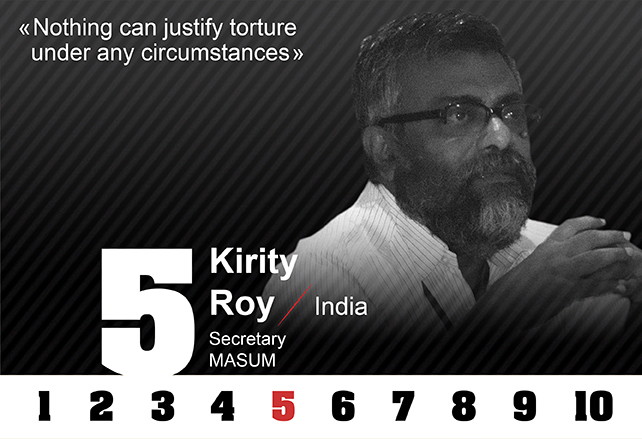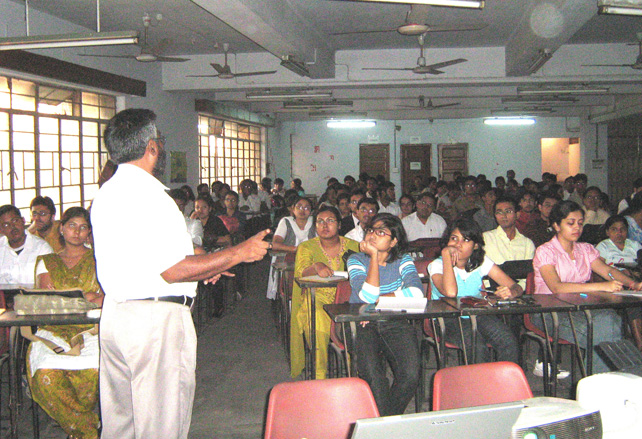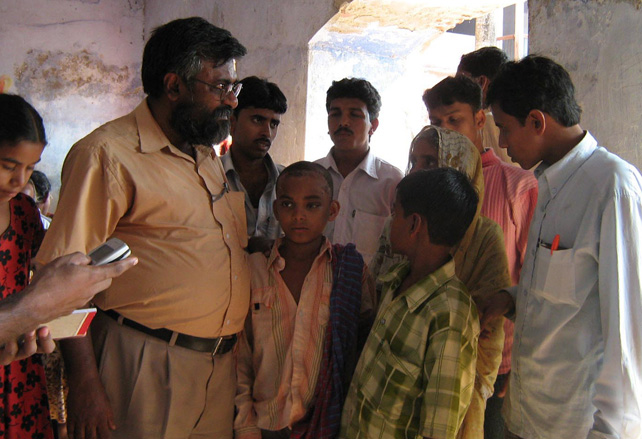Kirity Roy: Ten Portraits against Torture and Impunity
- Event Date: 05.12.12
- Event Time: 20:32:00

Please, briefly introduce yourself.
I was born in a lower middle class family of urban Kolkata, West Bengal. I lived with my parents and other siblings in an urban slum but I had access to regular school education. My economic background did not cause any hindrance to my quest.
I got involved with the left wing politics of that time. The reason was quite simple: from 1965 to 1975 the whole sub continent was in turmoil, the society itself was questing for a just and egalitarian society. In the course of my political life I dreamt of an exploitation free and egalitarian society. During that time I lost many near and dear ones who were my political companions due to extra-judicial killings. My family also faced harassment from the State because of my political involvement and sacrificed it normal life.
As a political activist I spent time with marginalised agrarian people of rural Bengal and I worked with people of urban slums. During a major part of my political life, I had to live underground. I learnt a lot about the societal realities. I came to know about the woes of agrarian poor and the misery of working people. This was instrumental for me to become a human rights activist.
With friends, I established Manabadhikar Suraksha Mancha (MASUM) in 1998, on the 50th anniversary of the Universal Declaration of Human Rights, to form a platform for human rights activists based in Calcutta, West Bengal and to strengthen the human rights movement. The work of MASUM now mainly focuses on custodial violence and atrocities by police and Border Security Force (BSF) (The BSF was established in 1965 to protect India’s land border during peace time and to prevent transnational crimes).

Today, what is the biggest challenge in the fight against torture in your country? Can you take stock of the situation of torture and ill-treatment in your country (the context, the extent of the problem, the type of victims and perpetrators, etc.)?
Bringing torturers and those authorising torture to justice sends a strong warning to all existing and would-be perpetrators. Though, torture is prohibited under international law, it has been practiced in many countries to different extent and severity and India is not an exception. While the right of torture survivors to redress is a basic human right enshrined in various international human rights treaties and recognised by several domestic laws in India, in reality most survivors never obtain redress.
Human rights abuses and torture are widespread and have routinely been practiced at police stations and other interrogation centres of police and para military forces in India, also in West Bengal (at Border Security Force’s camps along the Indo- Bangladesh bordering districts of West Bengal). Unchallenged and unopposed, it has become a 'normal' and 'legitimate' practice all over the province. The ineffective criminal justice system increases the numbers of custodial torture by leap and bounds.
The main perpetrators are the police, BSF, armed force personnel, the lower judiciary, components of the Criminal Justice System, prison and home officials, administrative officials, elected representatives.
The main victims are the people living at the fringes of society; people living near the border; political opponents and persons with marginalized preferences.
Challenges
- In recent time, a Torture Bill has been drafted at parliament but till date it has not been tabled. It may be a first step to the ratification of the United Nations Convention Against Torture (UNCAT) but the bill itself is not infallible and it has major drawbacks as the bill does not properly defined torture practices, engaged perpetrators, modus of prosecution and subsequent punishment.
- Armed Forces Special Power Act and section 197 of criminal procedure codes of India provides impunity to law government officials and therefore impeding torture victims to obtain redress.
- The lack of a proper victim and witness protection policy.
- A non-functioning health system (the majority of torture victims are from poor economical background and psychological and health deliverance is costly in India) and unethical practices of government medical practitioners.
- The components of criminal justice system are biased and do not deliver any good to the torture victims. Hence, ineffective criminal justice system increases the numbers of custodial torture by leap and bounds.
- The judiciary, in particular the Magistrate courts, are not independent from the executive.
- Human rights organisations are facing reprisals by the state. For example, MASUM activists are falsely implicated in criminal charges for organising an independent tribunal on torture (see below).
According to your experience, what are the root causes of torture and impunity?
- Poverty and socio- economic inequality
- Hierarchical political system
- Non participation of impoverished in socio- political and economic decision makings
- Non functional democracy
- An ineffective criminal justice system, lacking independence.
- Legislation establishing or encouraging impunity
- Non- equality before law
- Colonial mindsets of administration, police and armed forces
What is your approach and what kind of activities do you carry out to fight against torture and ill-treatment in your country? Can you give us examples of achievements linked to these activities?
Since 2006 Masum associated itself with a national programme on preventing torture in India and we are implementing the same in West Bengal, directly intervening in six districts of the state. We are mainly documenting police torture and specifically torture inflicted by BSF, on the Indo – Bangladesh Border. Through our initiative I have conducted awareness interaction with BSF personnel and district police of Murshidabad, a bordering district with continuous violations of human rights by BSF. Extra judicial killing and grievous physical assaults are rule of the day.
I have highlighted these human rights violations with the National Human Rights Commission and BSF officials, while meeting them on various occasions. I also regularly speak about the issue in front of students, activists, lawyers, human rights communities, social institutions, and governmental departments. I have also raised these concerned during my visits to United Nations head quarters (for example, before the Committee on Elimination of Racial Discrimination – CERD in 2007 where I highlighted the link between torture and social discrimination, and during the Universal Periodic Review of India).
Masum is conducting, among others, the following activities to fight torture and ill-treatment: conducting fact finding missions in torture vulnerable areas; monitoring and documenting cases of torture; filing complaints on each incident of torture before relevant authorities and international human rights mechanisms; counselling the victims; regularly conducting medical camps in the affected areas assisted by doctors and psychiatrists; providing psychological and medical support to the victims of torture, their families and other affected persons; providing shelter to the victims, their family members and witnesses intermittently depending on the situation; providing social support to the victims, their family member and other affected persons; conducting various activities (street campaign / village meetings, seminars, campaigns, protest marches…); organising workshops on human rights issues, notably torture, addressing different cross-sections of society, including the marginalized section of society; advocating for gender equality and fare means of livelihood; publishing books, periodicals, newsletters, booklets and leaflets; networking with national and international NGOs.

What obstacles do you encounter daily when carrying out your activities? - The non-responsive of human rights institutions and authorities; - An ineffective criminal justice system and the absence of an independent judiciary; this leads that many of our cases are not heard before the courts.
Do you feel threatened because of your activities? Do you face any interference in your work? If this is the case, can you kindly precise.
Apart from intimidation and constant threats here is an account of interference that we face: MASUM had organized a public hearing, “the Public Tribunal on Torture” on 9-10 June 2008. 86 victims of torture deposed before the panellists, comprising eminent legal, medical, psychological professionals and civil society activists.
After the successful completion of the public hearing, the Anti-terrorist cell of Kolkata Police lodged a First Information Report (FIR) against me and others as Taltolla PS Case No. 134/2008. Later on 12 June 2008 the police raided MASUM’s office with a search warrant from Chief Metropolitan Magistrate- Kolkata. Later on 7th April 2010, I was arrested by the Anti-Terrorist Cell of Kolkata Police and detained in police custody for the day and produced before the judicial magistrate and obtained bail. The case is still pending against us.
The whole act was not only prompted to come up with criminal charges against the activists of MASUM, rather it was a definite challenge posed by the state to squash civil society participation to hear the woes and pathos of victims of torture. The very act of the state stands as a proof that anyone raising voice against torture by the state will be crushed, and that the perpetrators in uniform will continue to enjoy complete immunity.
What needs to be done so that « Nothing justifies torture » becomes a reality in your country?
What needs to be done is an immediate ratification of the UN Convention against Torture (UNCAT) and its optional protocols with domestic legislation for the same; a responsive criminal justice system; the abolition of all laws establishing or encouraging impunity like section 197 of Criminal Procedure Code, Armed Forces Special Power Act, Border Security Force Act etc.; an independent judiciary; making the people sensitised on torture and a proper and adequate prosecution of perpetrators.
What part plays and should play the public opinion in the fight against torture and what can the public do to support the fight against torture?
Public opinion is a major tool to establish rights of the citizenry in a democracy. To challenge the ongoing practice of torture and rampant impunity a public opinion should be in place, but in our country the level of knowledge on the issue is very minimal.
In this scenario a greater focus should be put on opinion building in relation to the independence of judiciary, victim’s and witnesses protection and medical care of the victims. The public can demand for better legislation to condemn the ongoing practices. Opinion building on these issues is definitely a responsibility for civil society groups. International public opinion building is also needed to pressurise the domestic governance on ongoing practices.